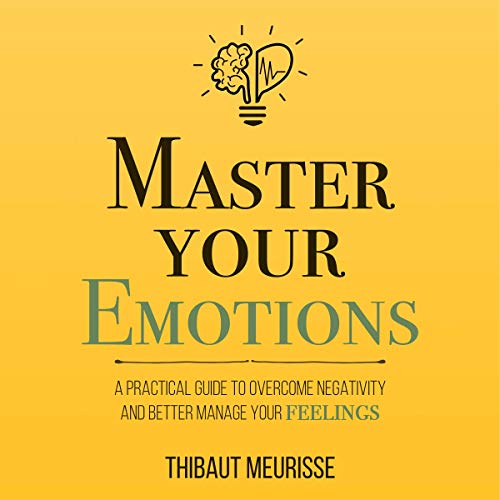“Master Your Emotions” is a comprehensive guide that helps readers understand their emotions, take control of them, and replace negative patterns with positive habits. Thibaut Meurisse offers practical strategies to help individuals break free from emotional overwhelm and navigate life’s challenges with a calm, resilient mindset.
Chapter 1: Understanding Emotions
Thibaut starts by emphasizing that emotions are natural and instinctual responses to life experiences. Emotions, whether positive or negative, serve as signals. By becoming more mindful of our emotional responses, we can better understand ourselves and make more conscious decisions. The first step toward mastering emotions is to accept them as an essential part of the human experience.
Chapter 2: Recognizing Emotional Triggers
In this chapter, the author focuses on identifying emotional triggers—specific situations, people, or experiences that evoke strong emotional reactions. By becoming more aware of these triggers, we can learn how to respond instead of reacting. Understanding why you feel the way you do in certain situations is the first step toward emotional control.
Chapter 3: The Power of Thought Patterns
This chapter dives into the connection between thoughts and emotions. Thibaut explains that emotions are often a direct result of our thought patterns. Negative thinking, such as catastrophizing or overgeneralizing, leads to negative emotions. By challenging these thought patterns and reframing them in a more balanced way, we can positively influence our emotional state.
Chapter 4: Developing Emotional Resilience
Resilience is the ability to bounce back after setbacks, and emotional resilience helps us cope with life’s challenges. Thibaut explains that emotional resilience can be developed through practice. He offers strategies like mindfulness, accepting discomfort, and focusing on solutions instead of problems. The more resilient you become, the easier it is to manage negative emotions.
Chapter 5: Taking Responsibility for Your Emotions
Thibaut emphasizes that taking responsibility for your emotions is a crucial step in mastering them. It’s easy to blame others or external circumstances for how we feel, but true emotional mastery comes when we accept that our emotions are our own responsibility. By choosing how we respond to situations, we regain control over our emotional well-being.
Chapter 6: The Role of Self-Talk
This chapter focuses on the power of self-talk—how the way we speak to ourselves can influence our emotions. Negative self-talk can fuel negative emotions, while positive affirmations and self-compassion can help regulate emotional states. Thibaut offers tools for reframing self-talk to create a healthier, more empowering internal dialogue.
Chapter 7: The Importance of Mindfulness
Mindfulness plays a key role in emotional mastery. Thibaut explains that being present in the moment allows us to recognize emotions as they arise and choose how to respond to them. Through mindfulness practices, we can break the cycle of automatic emotional reactions and instead choose more thoughtful and intentional responses.
Chapter 8: Building Healthy Emotional Habits
In this chapter, Thibaut outlines how to develop healthy emotional habits, such as practicing gratitude, keeping a journal, and surrounding yourself with supportive people. Consistency in these habits is key to maintaining emotional stability and gradually shifting from negative patterns to positive emotional states.
Chapter 9: Handling Stress and Anxiety
Stress and anxiety are common emotional experiences, but Thibaut shows that they can be managed through simple techniques like deep breathing, relaxation, and perspective shifts. By learning how to handle stress proactively, we can prevent it from taking control of our emotions and leading to negative patterns.
Chapter 10: Cultivating Positive Emotions
In the final chapter, Thibaut explores ways to cultivate positive emotions such as joy, love, and gratitude. He provides actionable strategies like practicing acts of kindness, engaging in activities that bring happiness, and focusing on what you can control. Cultivating positive emotions helps to counterbalance the inevitable negative feelings we all experience.






